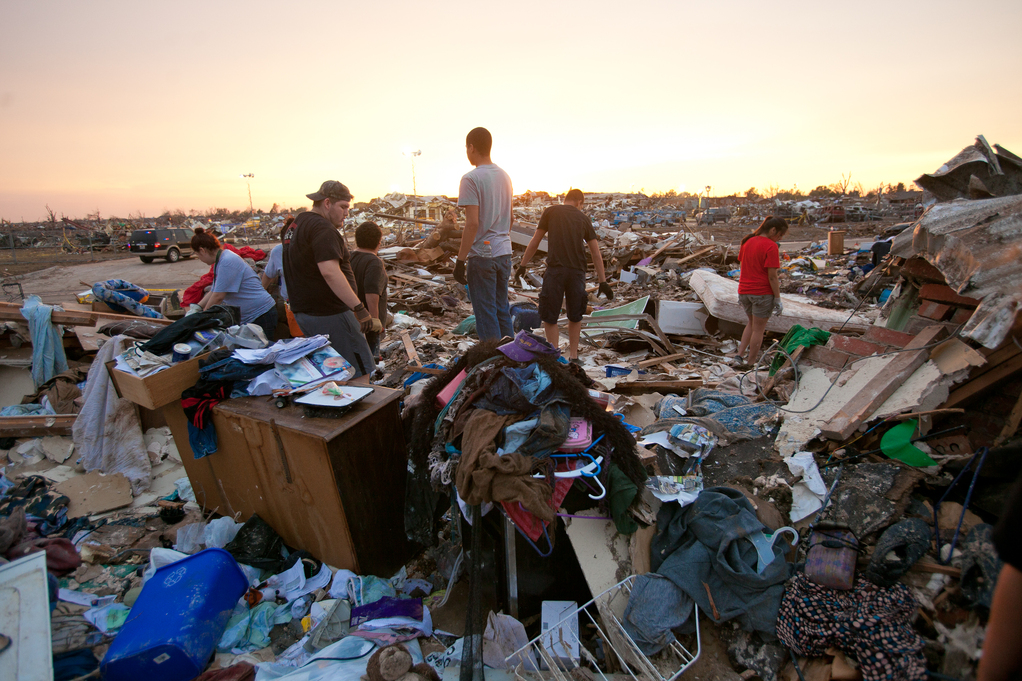
The Role of Nonprofits Post-Disaster
By AdministratorThis monthly blog series will explore the world of disasters and how Foundation Beyond Belief is creating evidence-based programs to mobilize the secular humanist community to respond.
Post-disaster, survivors are faced with a long and complex recovery process. Survivors seek aid from three sources. When faced with recovery, survivors first utilize their own resources. They spend their savings, find second jobs, and take out loans. Yet often this perseverance is not adequate to address all of their recovery needs. Individuals then turn to their social networks. They ask friends, family, co-workers, neighbors, etc. for assistance. Everything from borrowing money to simply asking for a place to stay while repairs are completed. Finally, if accessing their social networks still leaves them struggling to recover, individuals seek institutional assistance. Left with no other options, individuals seek aid from both government agencies and local and national nonprofits (Gould, 2014).
For many, their personal resources are not enough to cover the cost of recovery. Depending on the characteristics of the disaster and the demographics of the impacted population it may be the case that the members of a survivors entire social network are they themselves impacted. This was especially true during Katrina where 80% of the city flooded. New Orleans has the highest rate of nativity of any American city; as a result it was common for everyone in an individuals social network to have been impacted themselves by the storm (Campanella, 2008). Survivors widely report government run recovery programs as inefficient and ineffective, often missing the needs of entire populations or not adequately addressing needs of survivors.
These gaps are filled by existing nonprofits in the community, national nonprofits that come in from out of state, and new nonprofits that form specifically to address unmet needs. The majority of organizations and nonprofits involved in disaster relief and recovery are faith-based. Of the 60 main national disaster nonprofits only a handful are non-religious with none having specific ties to the humanist or freethinking community.
There is a correlation to some types of volunteer activity and membership to faith groups (not religiosity) (St John & Fuchs, 2002). Thus it isn’t the moral conviction that inspires involvement but the membership in an organization oriented towards serving others. As free-thinkers many of us are less inclined to become involved in formal organizations. When it comes time to volunteer and donate to disaster response and relief it isn’t that we don’t want to but that we may have less opportunities to. Joe Klein’s infamous statement describing the post-disaster scene of a tornado in Oklahoma, “…there was an occupying army of relief workers, led by local first responders, exhausted but still humping it a week after the storm, church groups from all over the country — funny how you don’t see organized groups of secular humanists giving out hot meals…” left many in our community feeling frustrated. As many of us correctly noted at the time he is of course wrong, there are local groups of secular humanists all over the country that become involved in response and recovery. But he was right that until now, there has been no nationally organized group of secular humanists with a specific mission of volunteering post-disaster.
This reasoning has inspired the development of Foundation Beyond Belief’s Humanist Disaster Recovery Programs.
References:
Campanella, R. (2008). Bienville’s dilemma: A historical geography of New Orleans. Lafayette, LA: Center for Louisiana Studies.
Gould, L. (2014). A conceptual model of the individual and household recovery process: Examining Hurricane Sandy. Thesis at North Dakota State University.
St John, C., & Fuchs, J. (2002). The heartland responds to terror: Volunteering after the bombing of the Murrah Federal Building. Social Science Quarterly,83(2), 397-415.
